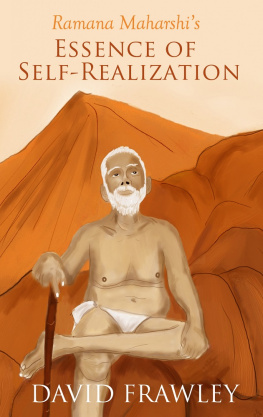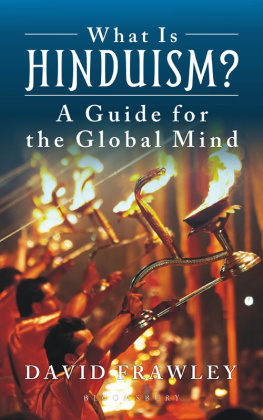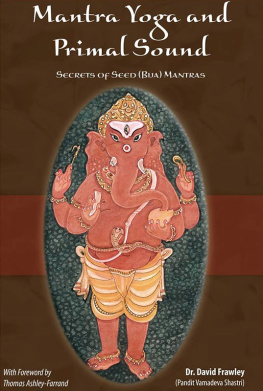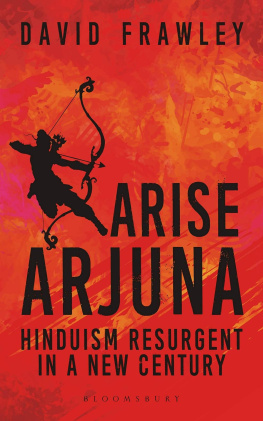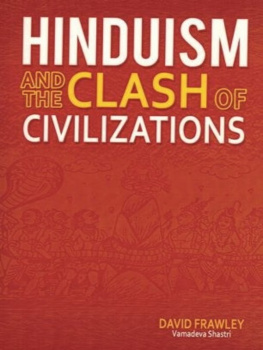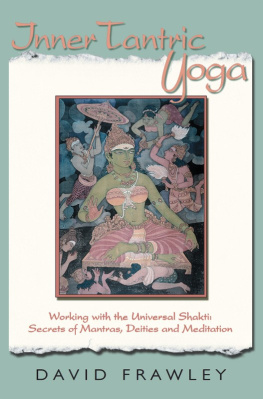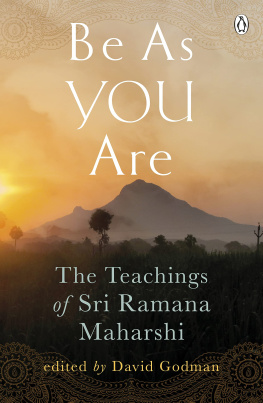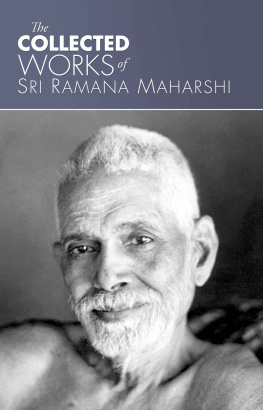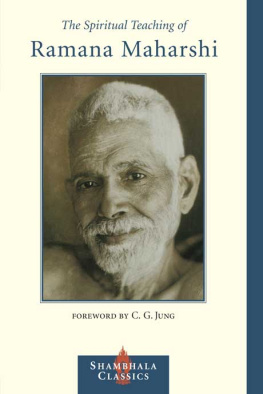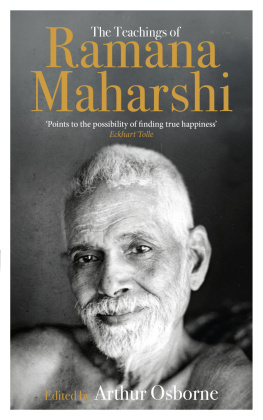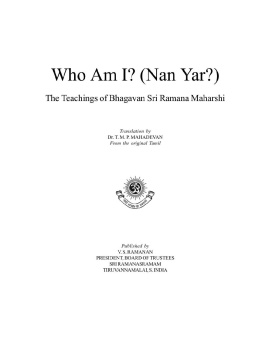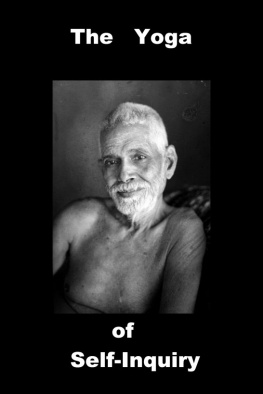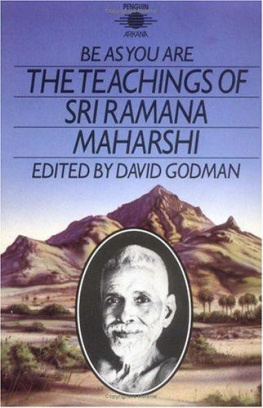David Frawley - Ramana Maharshis Essence of Self-Realization
Here you can read online David Frawley - Ramana Maharshis Essence of Self-Realization full text of the book (entire story) in english for free. Download pdf and epub, get meaning, cover and reviews about this ebook. publisher: Vedic Wisdom Press, genre: Religion. Description of the work, (preface) as well as reviews are available. Best literature library LitArk.com created for fans of good reading and offers a wide selection of genres:
Romance novel
Science fiction
Adventure
Detective
Science
History
Home and family
Prose
Art
Politics
Computer
Non-fiction
Religion
Business
Children
Humor
Choose a favorite category and find really read worthwhile books. Enjoy immersion in the world of imagination, feel the emotions of the characters or learn something new for yourself, make an fascinating discovery.
- Book:Ramana Maharshis Essence of Self-Realization
- Author:
- Publisher:Vedic Wisdom Press
- Genre:
- Rating:4 / 5
- Favourites:Add to favourites
- Your mark:
- 80
- 1
- 2
- 3
- 4
- 5
Ramana Maharshis Essence of Self-Realization: summary, description and annotation
We offer to read an annotation, description, summary or preface (depends on what the author of the book "Ramana Maharshis Essence of Self-Realization" wrote himself). If you haven't found the necessary information about the book — write in the comments, we will try to find it.
Ramana Maharshis Essence of Self-Realization — read online for free the complete book (whole text) full work
Below is the text of the book, divided by pages. System saving the place of the last page read, allows you to conveniently read the book "Ramana Maharshis Essence of Self-Realization" online for free, without having to search again every time where you left off. Put a bookmark, and you can go to the page where you finished reading at any time.
Font size:
Interval:
Bookmark:

Ramana Maharshis
Essence of
Self-realization
Translation and Commentary By
David Frawley

VEDIC WISDOM PRESS
An Imprint of Vedic Management Center
www.vedic-management.com
In association with
American Institute
of Vedic Studies
www.vedanet.com
Copyright 2018 by David Frawley
Edited by Dr Narasimha B. Bhat
The scanning, uploading, and distribution of this book without permission is a theft of the authors intellectual property. If you would like permission to use material from the book (other than for review purposes), please contact response@vedic-management.com. Thank you for your support for the authors rights.
Vedic Management Centre
www.vedic-management.com
Vedic Wisdom Press is an imprint of Vedic Management Centre. The Vedic Wisdom Press name and logo are trademarks of Vedic Management Centre.
The publisher is not responsible for websites (or their content) that are not owned by the publisher.
Vedic Management Centre offers its authors for a wide range of speaking events. To find out more, go to www.vedic-management.com or call +1 917 387 2735
Library of Congress Cataloguing-in-Publication Data has been applied for.
ISBN: 9781719899345
Printed at Thomson Press Limited
Table of Contents
Teachings of Bhagavan Ramana Maharshi
and the tradition of Advaita Vedanta
My Connection to Bhagavan Ramana
Background of Upadesha Saram
Ritual, Mantra and Meditation:
The Three Foundation Practices
Abidance in the Heart, the Essence of All
the Yogas
Meditating on the Shakti behind
Mind and Prana
Self-Inquiry: Asking the Question
Who am I?
Discrimination Between the Seer
and the Seen
Merging God and the Soul into
the Supreme Self
Note on Translator/Commentator
Sri Ramanasramam Contact Information
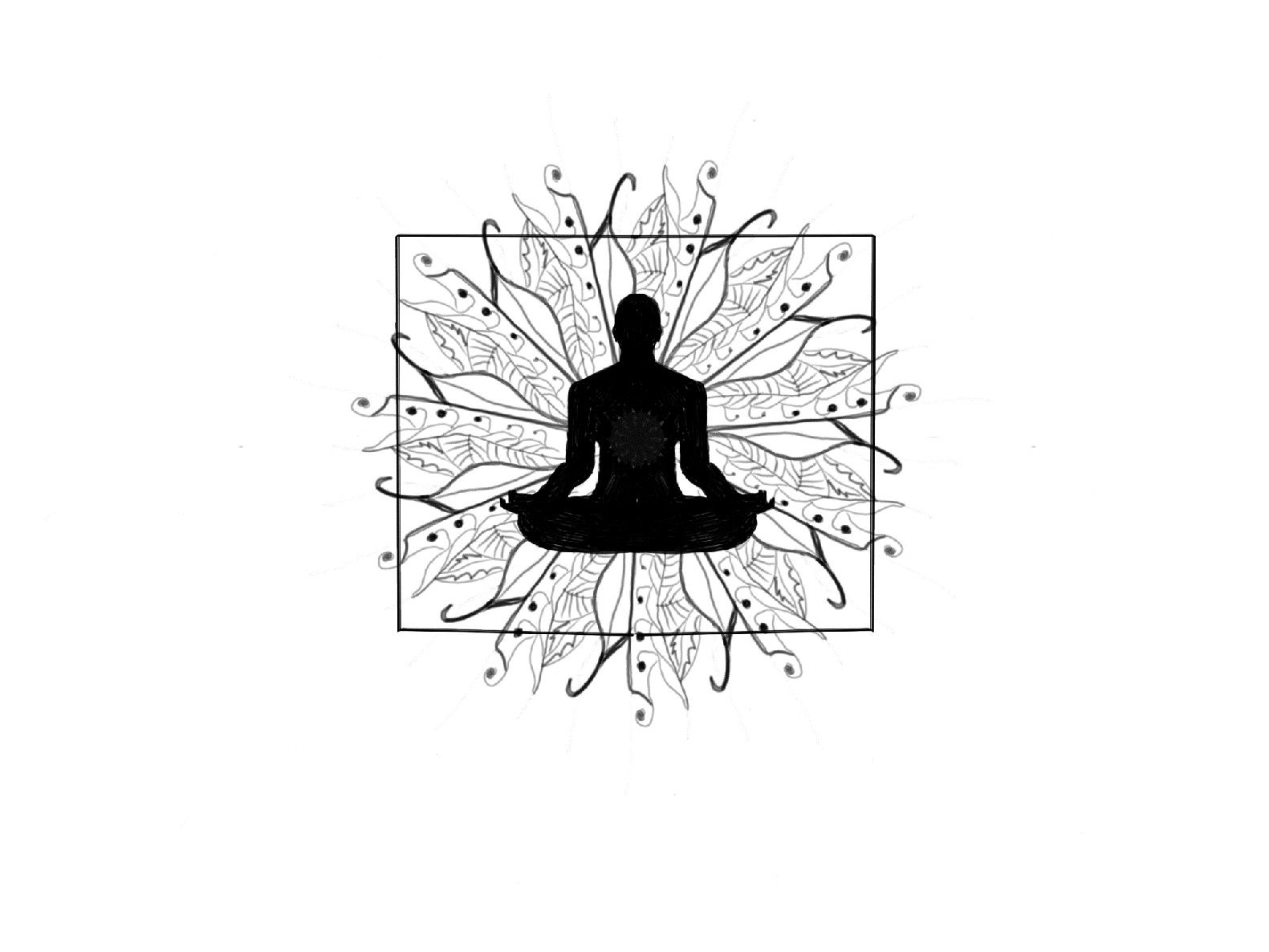
Introduction to the Teachings
Bhagavan Ramana Maharshi
and the tradition of
Advaita Vedanta
Bhagavan Ramana Maharshi (1878-1950) is probably the most renowned and respected sage of modern India, the very embodiment of the highest spiritual wisdom. He experienced his full Self-realization when a youth of only sixteen years and maintained that transcendent state of awareness throughout his life. Ramana can easily be compared to the greatest spiritual masters of humanity, most who had to labor much longer and face many more difficulties before reaching their full realization. Such an exalted teacher is extremely rare over the centuries and should be honored as a light for all humanity. Ramana is one of the main gurus for the world as a whole for years to come, spreading the transformative message of Self-inquiry, Self-knowledge and Self-realization for all, with clarity, compassion and grace.
The Maharshi mainly taught through silence and only answered questions at certain times of the day. Yet his was never any ordinary silence consisting of a mere absence of sound or lack of verbal communication. It was the profound inner silence and immutable stillness of the spiritual heart, reflecting an unwavering abidance in our true Self and Divine essence beyond all names, forms, words and expressions. Ramana was fully present and guiding others from within, even when externally he appeared silent, with eyes closed. His presence remains accessible to devotees and disciples even today.
The highest reality of pure Consciousness transcends body, mind and world. It is not the content of any idea, imagination or concept. It can only be approached through direct awareness and unmediated seeing, which is its very nature; just as the pure light of awareness. We may be able to communicate it to some degree by putting it into words; but we risk distorting it. We may misinterpret a mere verbal comprehension as a true comprehension of this very subtle and formless teaching. Therefore, as we strive to understand the words of the teachings, we should never forget that the transcendent silence behind them is the eventual goal.
The Maharshi did not read many books and composed few written teachings of his own during his life. His native language was Tamil but he did create a few short texts in Sanskrit as well. These were composed with the support of Kavyakantha Ganapati Muni, a great Yogi and Sanskrit scholar of the highest order in his own right, and one of Ramanas earliest and most important disciples. The Maharshis teachings placed in such Sanskrit verses are beautiful and poetic and yet reflect the highest truth and deepest insights with clarity and simplicity. They are gems of wisdom to be contemplated upon throughout ones entire lifetime. His shorter works are like the new sutras of Self-realization for generations to come.
My Connection with
Bhagavan Ramana
I have attempted to follow the teachings of Bhagavan Ramana, as best as I am able, for nearly fifty years now. This began with discovering his teachings when I was around twenty years of age. Subsequently I began meditating upon both his teachings and his radiant picture that has entranced so many people. Ramana became my spiritual father as it were, long before I first went to India. Later I visited the Ramanashram in India many times and wrote several articles for its journal, the Mountain Path.
As one who loves mountains, the sacred mountain of Arunachala, said to be the fire form of Lord Shiva that Ramana worshipped, particularly inspired me. I was similarly inspired by the monumental Shiva and Devi temple at Tiruvannamalai where Ramana stayed when he was a youth. I felt a strong connection to the Devi or Divine Mother there whose presence I could feel and communicate with.
For me, Ramana expressed the teachings of Advaita Vedanta and the great teacher Adi Shankara in clear contemporary terms. I studied the works of Shankara and Ramana together. I see Ramana as the Shankara of today, though teaching more through silence than through commentaries and hymns, which was Shankara's approach centuries ago. In addition, during my meditations I came to recognize Ramana as Lord Skanda/Murugan, Lord Shivas son born of fire, the destroyer of all ignorance; and came to appreciate the power of his teachings to take us beyond death and sorrow. Ramana holds that fiery power of tapas that can purify us from all karmas.
At the Ramanashram I experienced the light of Ramana, which still powerfully illuminates the ashram and the entire sacred mountain; and over time, I met with many of the luminaries and senior devotees there. Notably, I received important guidance from Sri K. Natesan for many years. Natesan passed away in 2009 at the age of ninety-six, having been connected to Ramana since his childhood. He explained the teachings of Ramana to me in simple and direct terms, and provided me a living link with Ramana.
Natesan was also associated with Ganapati, and provided a living link with the Munis teachings as well, whose Sanskrit works he carefully collected for decades and eventually published in twelve volumes, completing this monumental task shortly before his passing. These volumes included the Sanskrit versions of Ramanas works and related commentaries and poems by the Muni on Ramanas teachings, as well as the many other hymns, poems, chants, mantras, sutras and philosophical works of the Muni himself, extending to profound studies of the ancient Vedas.
Next pageFont size:
Interval:
Bookmark:
Similar books «Ramana Maharshis Essence of Self-Realization»
Look at similar books to Ramana Maharshis Essence of Self-Realization. We have selected literature similar in name and meaning in the hope of providing readers with more options to find new, interesting, not yet read works.
Discussion, reviews of the book Ramana Maharshis Essence of Self-Realization and just readers' own opinions. Leave your comments, write what you think about the work, its meaning or the main characters. Specify what exactly you liked and what you didn't like, and why you think so.

